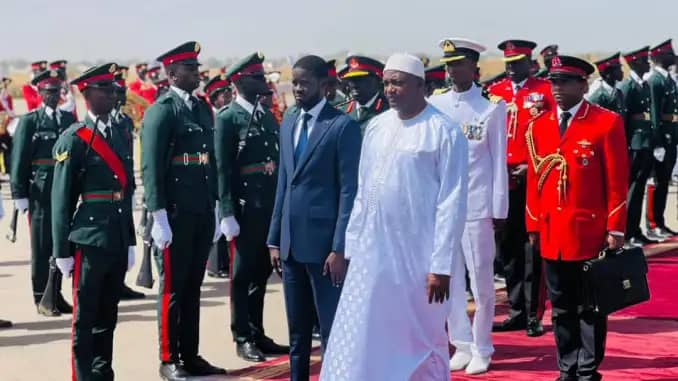Dakar – Banjul Axis: “Crucial synergy in the face of security challenges and co-development issues”
What is at stake in the President's visit to Gambia?
- Advertisement -
President Bassirou Diomaye Faye’s visit to the Gambia, just after his visit to Mauritania, is part of a two-pronged approach. On the one hand, to ensure national security; and on the other, to reaffirm the desire of the new Senegalese authorities to strengthen the Banjul-Dakar axis. These are the quintessential words of Bakary Sambe, Regional Director of the Timbuktu Institute, in an interview with the Senegalese national daily newspaper Le Soleil.
What is at stake in the President’s visit to Gambia?
The stakes of this visit to Gambia are clear. First of all, the new authorities have reaffirmed the intangibility of the nature and content of this crucial relationship, both for national security and for the co-development that has always characterized the Banjul-Dakar axis. So, while meeting Gambia’s expectations of continuity, the atmosphere and the speeches that marked this visit seem to reflect this specificity and, above all, to recall the constants. In a discursive analysis, when the Senegalese president, in his address, insists on a personal “fraternity” that goes beyond institutional and diplomatic relations, it is not only to consciously “break” the codes and rigors of protocol as can be seen in his new style, it is above all for President Faye to reaffirm the natural, continuous and irreversible character of a relationship that will always defy time and, with it, passing regimes. But all in all, this visit, which gave diplomatic pledges and seems to be part of a dynamic to consolidate gains, was an opportunity to make decisive contacts, but also heralded fine prospects for cooperation.
- Advertisement -
What areas do the two heads of state need to work on in order to bring their cooperation to fruition?
- Advertisement -
As part of a ground-breaking field study in Gambia, soon to be published, the Timbuktu Institute, in synergy with Gambian researchers, was able to document the interest of both countries in strengthening their security cooperation, particularly in the context of prevention and the development of a real partnership policy to tackle cross-border challenges in the current sub-regional context. Although still in need of consolidation, the foundations of the relationship between The Gambia and Senegal have been firmly in place since independence.
This was already the case from a political and diplomatic point of view, but the opportunities seem to be multiplying, with road infrastructures further facilitating economic exchanges through human mobility thanks to the bridge, and backed up by multiple and varied agreements. With the security environment vastly improved compared to ten years ago, with the stabilization of the conflict in Casamance, immense economic opportunities are opening up that will benefit both our territorial continuity and the growth of the Gambian economy, which is closely linked to its trade with Senegal. This is as true for the revival of the maritime economy as it is for agriculture and investment.
Moreover, on the occasion of the forthcoming summit of the Organization of Islamic Cooperation to be held in the sister Republic of the Gambia, Senegalese-Gambian players are co-organizing an investment forum, which further reflects the embedded nature of the relationship at the very level of our respective populations. The political authorities should seize this opportunity offered by the private sector for economic diplomacy.
- Advertisement -
In any case, the official invitation to this crucial Summit reiterated by President Adama Barrow, and already accepted by President Bassirou Diomaye Faye during this visit, shows, among other diplomatic acts, that there is a deep awareness of common challenges, and a jointly renewed determination to make the Banjul-Dakar axis a living model of regional cooperation and integration.
Does the fact that he is making his first visit to Mauritania and his second to Gambia, two African countries, mean that the new president is determined to break with Françafrique?
President Bassirou Diomaye Faye’s words are unambiguous: “We are fortunate to have come to power with a pan-African project that strengthens solidarity and politics between African countries. This renewed and strengthened solidarity has enabled the Senegalese people to put their trust in us and entrust us with the reins of power”. But Senegal’s diplomatic tradition has always emphasized good neighborliness and efforts to achieve African integration and unity. Indeed, the title of the new Ministry of African Integration and Foreign Affairs could not be more eloquent in illustrating this reinforced choice by the new authorities.
It’s a roadmap in itself. So it’s easy to see where our priorities lie. The choice of Mauritania is just as logical as that of Gambia, at the heart of our strategic depth and with which we have one of the longest borders, not to mention the level of cultural and linguistic cross-fertilization that adds to this country’s vital importance for a definitive solution to the crisis in Casamance. Our respective governments are aware of the dimension that has always guided this cooperation.
Moreover, in keeping with diplomatic tradition, the final communiqué agreed that the Heads of State would consult each other regularly on matters of mutual interest, and even agreed to hold the next session of the Senegalese-Gambian Presidential Council in Dakar, in the Republic of Senegal, “on dates to be set at a later date”.
- Advertisement -


